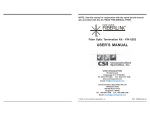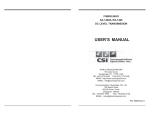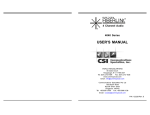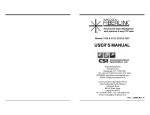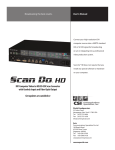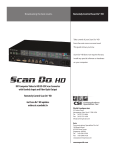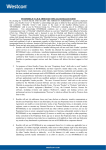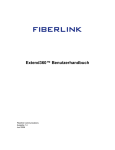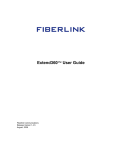Download USER`S MANUAL
Transcript
16 and 32 Channel Audio Multiplexer 4160 and 4320 Series USER’S MANUAL WORLD HEADQUARTERS 55 Cabot Court Hauppauge, N.Y. 11788 USA Tel: (631) 273-0404 Fax: (631) 273-1638 www.commspecial.com Email: [email protected] Communications Specialties Pte Ltd 100 Beach Road #22-09 Shaw Tower Singapore 189702 Tel: +65 6391 8790 Fax: +65 6396 0138 Email: [email protected] P/N: 122915 Rev. E CONTENTS General Information ................................................................................... 3 Introduction ........................................................................ 3 Technical Specifications ..................................................... 3 Installation Instructions .............................................................................. 5 Installation Procedure ......................................................... 5 System System Switch Settings..………………………. ... 6 System Terminal Block Connections..……………….. .... 7 Optical Interface ................................................................. 8 Indicator LEDs ................................................................... 8 Operating Pointers and Troubleshooting .................................................... 9 Maintenance .......................................................................................... 10 Statement of Warranty .............................................................................. 11 ©2003, Communications Specialties, Inc. Pure Digital Fiberlink and the Starburst logo are registered trademarks of Communications Specialties, Inc. 12 1 easily add more attenuation than specified, resulting in poor overall performance. GENERAL INFORMATION If, after reviewing the above possibilities, the system is still not operating, please contact the Customer Service Department for further assistance Introduction The Pure Digital Fiberlink® 4160 and 4320 series optical transmission systems are configurable, adjustment-free transmitter/receiver pairs that employ all digital processing and transmission techniques. The 4160 series provides up to 16 audio channels and the 4320 series provides up to 32 audio channels. Both series are one-way systems. The use of digital encoding assures high-quality noise-free transmissions that retain all of their initial parameters regardless of fiber optic cable attenuation. In addition, integral LED indicators are provided on each unit to continuously signify the presence of audio signals and, thus, the proper operation of each side of the system. MAINTENANCE The Pure Digital Fiberlink 4160 and 4320 Series transmission units have been manufactured using the latest semiconductor devices and techniques that electronic technology has to offer. They have been designed for long, reliable, and trouble free service and are not normally field repairable. Should difficulty be encountered, Communications Specialties maintains a complete service facility to render accurate, timely and reliable service of all products. Technical Specifications The only maintenance that can be provided by the user is to ascertain that optical connectors are free of dust or dirt that could interfere with light transmission and that electrical connections are secure and accurate. All other questions or comments should be directed to our Customer Service Department. It should be noted that many “problems” can easily be solved by a simple telephone call. 10 Model Part Numbering Configurations: Unit Type Transmitter Box Transmitter Box Receiver Box Receiver Box x Values: N = no second input/output (x 2 only) S = ST connector F = FCPC connector y Values: 0 = no second input/output (y 2 only) 1 = 850 nm Multimode 3 = 1310 nm Multimode 7 = 1310 nm Single Mode 9 = 1550 nm Single Mode 3 Part Number 4160-x1x2y1y2-zz 4320-x1x2y1y2-zz 4161-x1x2y1y2-zz 4321-x1x2y1y2-zz zz Values (line cord type): NA = N. American EU = European JP = Japanese UK = United Kingdom AU = Australian Audio: Bandwidth ............................... 20 Hz to 20 kHz, +0/-0.5 dB Input Impedance ..................... 600 Ohms terminated or >24 k Ohms unterminated; balanced or unbalanced Output Impedance................... 50 Ohms Input/Output Voltage .............. +24dBu max THD+N ................................... 0.002%; 20 Hz - 20 kHz SNR (A-Weighted) .................. 95 dB System Latency ........................ 200 uS + fiber cable propagation delay (typically 5 uS/km of fiber) Signal Connectors ..................... Removable terminal block Optical Fiber: Optical: Operating Wavelength ................... 850nm, 1310nm, 1550nm MM/SM Optical Fiber .................................. 62.5/125microns MM or 8-10/125 microns SM Optical Connectors ........................ ST or FCPC Troubleshooting: Wavelength 850 MM 1310 MM 1310 SM 1550 SM Loss Budget (in dB) 0-20 0-25 0-25 0-25 Distance* (in km) 0-2 0-10 0-60 0-80 *Note: Distance specifications are only approximate and are not guaranteed. Operating loss budget must not be exceeded. Misc: Operating Temperature Range .......... -35 to +30 degrees C Operating Power ............................. 95 to 250 VAC, 47 - 63 Hz CAUTION! The transmitting element in some versions of the Pure Digital Fiberlink transmitter unit is a solid-state Laser Diode located in the optical connector on the unit. This device emits invisible infrared electromagnetic radiation which can be harmful to human eyes. The radiation from this optical connector, if viewed at close range without a fiber optic cable connected to the optical connector, may be of sufficient intensity to cause instantaneous damage to the retina of the eye. Direct viewing of this radiation should be avoided at all times. 4 OPERATING POINTERS AND TROUBLESHOOTING The 4160 and 4320 Series are available in versions that operate with most multimode (MM) and single-mode (SM) optical fibers. Be certain that the correct size fiber is being used for the particular transmitter/receiver combination. Also be certain that the attenuation and bandwidth of the fiber optic cable being used is within the range of the system’s loss budget specifications. Multimode fiber optic cable contains an optical fiber with a light carrying “core” that is only .0025 inches (62.5 microns) in diameter. Single-mode fiber optic cable has an even smaller “core”, only 00032 to .0004 inches (8-10 microns). This is smaller than a human hair! As a result, any minute particles of dirt or dust can easily block the fiber from accepting or radiating light. Therefore, the key word is cleanliness. Always use the dust caps provided with all optical connectors whenever they are exposed to air. Also, it is a good idea to gently clean the tip of an optical connector with a lint-free cloth moistened with alcohol whenever dust is suspected. The status of any of the audio indicator LEDs should provide the first clue as to the origin of any operation failure. If all the LEDs are off, it usually means that the fiber is broken or has too much attenuation. Next, be certain that the input and output signal connections are proper. Due to the number of positions, it is possible that there may be wrong connections. Finally, although multimode and single mode devices may look the same, they will not operate properly together. Using the wrong device or fiber can 9 Optical Interface The 4160 and 4320 can be configured to provide redundant fiber interfaces as follows: Optical 1: Standard on all units Optical 2: Redundant option, which may be configured to transmit at a different wavelength and use a different connector type than Optical 1. Indicator LEDs There are multiple indicator LEDs on the 4160 and 4320 Series transmitter and receiver units that are used to monitor operation. The status of these LEDs are as follows: TRANSMITTER and RECEIVER: Power: ON: (Green) Indicates that correct power has been applied. TRANSMITTER: (one LED corresponds to each audio channel) Audio OFF: Indicates no audio detected by the transmitter unit. 1 thru 16 or 32: BLINKING: Indicates audio for that channel has been detected by the transmitter unit. RECEIVER: (one LED corresponds to each audio channel) Audio OFF: Indicates no audio detected over fiber and, as a result, 1 thru 16 or 32: no active audio detected by the receiver unit. BLINKING: Indicates audio for that channel has been detected over fiber and, as a result, active audio detected by the receiver unit. Optic 1 & 2: OFF: Indicates normal operation; fiber connected and signal present. ON: (Red) Indicates no signal on fiber or fiber not connected 8 INSTALLATION INSTRUCTIONS Installation Procedure The Pure Digital Fiberlink 4160/4320 Series transmission systems are normally preset for immediate use with the audio input circuitry set for balanced 600 Ohm input impedance and the output set for balanced audio. If a different protocol is desired, it can be easily selected using the flip switches located on the back panel of the unit. (See table on next page.) There are indicator LEDs on the units for monitoring purposes and several user selectable options for configuring audio inputs and outputs. The following instructions describe the typical installation procedure and the function of the LED indicators. 1. The various options, as already mentioned, have been preset. If unbalanced high-input impedance or unbalanced output is desired, please refer to instructions on the following page. 2. When using single optical configuration, connect a fiber optic cable between the “Optical 1” connectors of the Pure Digital Fiberlink transmitter and receiver units. When using redundant configuration, also connect a fiber cable between the “Optical 2” connectors on each unit. 3. Apply power to both Pure Digital Fiberlink units. 4. When power is applied, the green POWER LED will light, indicating the presence of operating power. 5. Connect the audio input signals to the proper positions on the removable terminal blocks. (Refer to the next section for details.) Be certain to check all connections and assure that inputs and outputs are not intermixed. 6. The green audio LED indicators (one per channel) will give an indication as stated on page 8. 7. The system should now be operational. 5 System Switch Settings The audio interface circuit used in this product has external rear panel switches that are used to configure the signal options. If you wish to make changes to the factory default settings, please refer to the following sections. Balanced/Unbalanced Audio The transmitter and receiver units each have a set of switches that allow the user to specify whether audio input/output should be balanced or unbalanced for each channel. Each end is configured separately. For example, channel 12 may be configured to have balanced input on the transmitter unit and unbalanced output on the receiver unit. The following chart indicates how to use the “BAL/UNBAL” set of switches. One switch corresponds to each channel available in the series. BAL Transmitter Receiver UNBAL Left/Off = balanced input Left/Off = balanced output Right/On = unbalanced input Right/On = unbalanced output High Impedance/24 kOhm Termination The transmitter unit has a second set of switches that allows the user to select between a high impedance >24 k Ohm input termination or a 600 Ohm input termination. This set is labeled “TERM HI-Z/600.” One switch corresponds to each channel available in the series. Use the settings as follows: Transmitter TERM HI-Z 600 Left/Off = High impedance >24 k Ohm Right/On = 600 Ohm termination termination 6 System Terminal Block Connections The input and output connections for the Pure Digital Fiberlink 4160 and 4320 Series systems are as follows: Audio Connector - Transmitter Unit: Balanced Position 1Channel 1 Input (-) Postition 1+ Channel 1 Input (+) Position G Ground Position 2Channel 2 Input (-) Position 2+ Channel 2 Input (+) Unbalanced Channel 1 Ground Channel 1 Signal Channel 2 Ground Channel 2 Signal This pattern continues for all available channels in the series. Odd and even positions are grouped in pairs, with a Position G between them. For example, the next five connections would be: Position 3-, Position 3+, Position G, Position 4-, Position 4 +. Audio Connector - Receiver Unit: Balanced Position 1Channel 1 Output (-) Postition 1+ Channel 1 Output (+) Position G Ground Position 2Channel 2 Output (-) Position 2+ Channel 2 Output (+) Unbalanced Channel 1 Ground Channel 1 Signal Channel 2 Ground Channel 2 Signal This pattern continues for all available channels in the series. Odd and even positions are grouped in pairs, with a Position G between them. For example, the next five connections would be: Position 3-, Position 3+, Position G, Position 4-, Position 4 +. 7 System Switch Settings The audio interface circuit used in this product has external rear panel switches that are used to configure the signal options. If you wish to make changes to the factory default settings, please refer to the following sections. Balanced/Unbalanced Audio The transmitter and receiver units each have a set of switches that allow the user to specify whether audio input/output should be balanced or unbalanced for each channel. Each end is configured separately. For example, channel 12 may be configured to have balanced input on the transmitter unit and unbalanced output on the receiver unit. The following chart indicates how to use the “BAL/UNBAL” set of switches. One switch corresponds to each channel available in the series. BAL Transmitter Receiver UNBAL Left/Off = balanced input Left/Off = balanced output Right/On = unbalanced input Right/On = unbalanced output High Impedance/24 kOhm Termination The transmitter unit has a second set of switches that allows the user to select between a high impedance >24 k Ohm input termination or a 600 Ohm input termination. This set is labeled “TERM HI-Z/600.” One switch corresponds to each channel available in the series. Use the settings as follows: Transmitter TERM HI-Z 600 Left/Off = High impedance >24 k Ohm Right/On = 600 Ohm termination termination 6 System Terminal Block Connections The input and output connections for the Pure Digital Fiberlink 4160 and 4320 Series systems are as follows: Audio Connector - Transmitter Unit: Balanced Position 1Channel 1 Input (-) Postition 1+ Channel 1 Input (+) Position G Ground Position 2Channel 2 Input (-) Position 2+ Channel 2 Input (+) Unbalanced Channel 1 Ground Channel 1 Signal Channel 2 Ground Channel 2 Signal This pattern continues for all available channels in the series. Odd and even positions are grouped in pairs, with a Position G between them. For example, the next five connections would be: Position 3-, Position 3+, Position G, Position 4-, Position 4 +. Audio Connector - Receiver Unit: Balanced Position 1Channel 1 Output (-) Postition 1+ Channel 1 Output (+) Position G Ground Position 2Channel 2 Output (-) Position 2+ Channel 2 Output (+) Unbalanced Channel 1 Ground Channel 1 Signal Channel 2 Ground Channel 2 Signal This pattern continues for all available channels in the series. Odd and even positions are grouped in pairs, with a Position G between them. For example, the next five connections would be: Position 3-, Position 3+, Position G, Position 4-, Position 4 +. 7 Optical Interface The 4160 and 4320 can be configured to provide redundant fiber interfaces as follows: Optical 1: Standard on all units Optical 2: Redundant option, which may be configured to transmit at a different wavelength and use a different connector type than Optical 1. Indicator LEDs There are multiple indicator LEDs on the 4160 and 4320 Series transmitter and receiver units that are used to monitor operation. The status of these LEDs are as follows: TRANSMITTER and RECEIVER: Power: ON: (Green) Indicates that correct power has been applied. TRANSMITTER: (one LED corresponds to each audio channel) Audio OFF: Indicates no audio detected by the transmitter unit. 1 thru 16 or 32: BLINKING: Indicates audio for that channel has been detected by the transmitter unit. RECEIVER: (one LED corresponds to each audio channel) Audio OFF: Indicates no audio detected over fiber and, as a result, 1 thru 16 or 32: no active audio detected by the receiver unit. BLINKING: Indicates audio for that channel has been detected over fiber and, as a result, active audio detected by the receiver unit. Optic 1 & 2: OFF: Indicates normal operation; fiber connected and signal present. ON: (Red) Indicates no signal on fiber or fiber not connected 8 INSTALLATION INSTRUCTIONS Installation Procedure The Pure Digital Fiberlink 4160/4320 Series transmission systems are normally preset for immediate use with the audio input circuitry set for balanced 600 Ohm input impedance and the output set for balanced audio. If a different protocol is desired, it can be easily selected using the flip switches located on the back panel of the unit. (See table on next page.) There are indicator LEDs on the units for monitoring purposes and several user selectable options for configuring audio inputs and outputs. The following instructions describe the typical installation procedure and the function of the LED indicators. 1. The various options, as already mentioned, have been preset. If unbalanced high-input impedance or unbalanced output is desired, please refer to instructions on the following page. 2. When using single optical configuration, connect a fiber optic cable between the “Optical 1” connectors of the Pure Digital Fiberlink transmitter and receiver units. When using redundant configuration, also connect a fiber cable between the “Optical 2” connectors on each unit. 3. Apply power to both Pure Digital Fiberlink units. 4. When power is applied, the green POWER LED will light, indicating the presence of operating power. 5. Connect the audio input signals to the proper positions on the removable terminal blocks. (Refer to the next section for details.) Be certain to check all connections and assure that inputs and outputs are not intermixed. 6. The green audio LED indicators (one per channel) will give an indication as stated on page 8. 7. The system should now be operational. 5 Audio: Bandwidth ............................... 20 Hz to 20 kHz, +0/-0.5 dB Input Impedance ..................... 600 Ohms terminated or >24 k Ohms unterminated; balanced or unbalanced Output Impedance................... 50 Ohms Input/Output Voltage .............. +24dBu max THD+N ................................... 0.002%; 20 Hz - 20 kHz SNR (A-Weighted) .................. 95 dB System Latency ........................ 200 uS + fiber cable propagation delay (typically 5 uS/km of fiber) Signal Connectors ..................... Removable terminal block Optical Fiber: Optical: Operating Wavelength ................... 850nm, 1310nm, 1550nm MM/SM Optical Fiber .................................. 62.5/125microns MM or 8-10/125 microns SM Optical Connectors ........................ ST or FCPC Troubleshooting: Wavelength 850 MM 1310 MM 1310 SM 1550 SM Loss Budget (in dB) 0-20 0-25 0-25 0-25 Distance* (in km) 0-2 0-10 0-60 0-80 *Note: Distance specifications are only approximate and are not guaranteed. Operating loss budget must not be exceeded. Misc: Operating Temperature Range .......... -35 to +55 degrees C Operating Power ............................. 95 to 250 VAC, 47 - 63 Hz CAUTION! The transmitting element in some versions of the Pure Digital Fiberlink transmitter unit is a solid-state Laser Diode located in the optical connector on the unit. This device emits invisible infrared electromagnetic radiation which can be harmful to human eyes. The radiation from this optical connector, if viewed at close range without a fiber optic cable connected to the optical connector, may be of sufficient intensity to cause instantaneous damage to the retina of the eye. Direct viewing of this radiation should be avoided at all times. 4 OPERATING POINTERS AND TROUBLESHOOTING The 4160 and 4320 Series are available in versions that operate with most multimode (MM) and single-mode (SM) optical fibers. Be certain that the correct size fiber is being used for the particular transmitter/receiver combination. Also be certain that the attenuation and bandwidth of the fiber optic cable being used is within the range of the system’s loss budget specifications. Multimode fiber optic cable contains an optical fiber with a light carrying “core” that is only .0025 inches (62.5 microns) in diameter. Single-mode fiber optic cable has an even smaller “core”, only 00032 to .0004 inches (8-10 microns). This is smaller than a human hair! As a result, any minute particles of dirt or dust can easily block the fiber from accepting or radiating light. Therefore, the key word is cleanliness. Always use the dust caps provided with all optical connectors whenever they are exposed to air. Also, it is a good idea to gently clean the tip of an optical connector with a lint-free cloth moistened with alcohol whenever dust is suspected. The status of any of the audio indicator LEDs should provide the first clue as to the origin of any operation failure. If all the LEDs are off, it usually means that the fiber is broken or has too much attenuation. Next, be certain that the input and output signal connections are proper. Due to the number of positions, it is possible that there may be wrong connections. Finally, although multimode and single mode devices may look the same, they will not operate properly together. Using the wrong device or fiber can 9 easily add more attenuation than specified, resulting in poor overall performance. GENERAL INFORMATION If, after reviewing the above possibilities, the system is still not operating, please contact the Customer Service Department for further assistance Introduction The Pure Digital Fiberlink® 4160 and 4320 series optical transmission systems are configurable, adjustment-free transmitter/receiver pairs that employ all digital processing and transmission techniques. The 4160 series provides up to 16 audio channels and the 4320 series provides up to 32 audio channels. Both series are one-way systems. The use of digital encoding assures high-quality noise-free transmissions that retain all of their initial parameters regardless of fiber optic cable attenuation. In addition, integral LED indicators are provided on each unit to continuously signify the presence of audio signals and, thus, the proper operation of each side of the system. MAINTENANCE The Pure Digital Fiberlink 4160 and 4320 Series transmission units have been manufactured using the latest semiconductor devices and techniques that electronic technology has to offer. They have been designed for long, reliable, and trouble free service and are not normally field repairable. Should difficulty be encountered, Communications Specialties maintains a complete service facility to render accurate, timely and reliable service of all products. Technical Specifications The only maintenance that can be provided by the user is to ascertain that optical connectors are free of dust or dirt that could interfere with light transmission and that electrical connections are secure and accurate. All other questions or comments should be directed to our Customer Service Department. It should be noted that many “problems” can easily be solved by a simple telephone call. 10 Model Part Numbering Configurations: Unit Type Transmitter Box Transmitter Box Receiver Box Receiver Box x Values: N = no second input/output (x 2 only) S = ST connector F = FCPC connector y Values: 0 = no second input/output (y 2 only) 1 = 850 nm Multimode 3 = 1310 nm Multimode 7 = 1310 nm Single Mode 9 = 1550 nm Single Mode 3 Part Number 4160-x1x2y1y2-zz 4320-x1x2y1y2-zz 4161-x1x2y1y2-zz 4321-x1x2y1y2-zz zz Values (line cord type): NA = N. American EU = European JP = Japanese UK = United Kingdom AU = Australian LIMITED WARRANTY Communications Specialties, Inc. (CSI) warrants that for a period of three years after purchase by the Buyer, the Pure Digital Fiberlink 4160 and 4320 Series Transmission System will be free from defects in material and workmanship under normal use and service. A Return Material Authorization (RMA) number must be obtained from CSI before any equipment is returned by the Buyer. All material must be shipped to CSI at the expense and risk of the Buyer. CSI’s obligation under this warranty will be limited, at its option, to either the repair or replacement of defective units, including free materials and labor. In no event shall CSI be responsible for any incidental or consequential damages or loss of profits or goodwill. CSI shall not be obligated to replace or repair equipment that has been damaged by fire, war, acts of God, or similar causes, or equipment that has been serviced by unauthorized personnel, altered, improperly installed or abused. RMA numbers and repairs can be obtained from: Communications Specialties, Inc. 55 Cabot Court Hauppauge, N.Y. 11788 USA Tel: (631) 273-0404 Fax: (631) 273-1638 www.commspecial.com Email: [email protected] Or in the Asia Pacific Region: Communications Specialties Pte Ltd 100 Beach Road #22-09 Shaw Tower Singapore 189702 Tel: +65 6391 8790 Fax: +65 6396 0138 Email: [email protected] Please have your serial number (located on the bottom label of the unit) available when contacting us. 2 11












